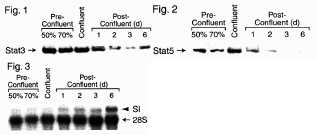Abstracts
1998 Digestive Disease Week
#985
INTESTINAL CELL DIFFERENTIATION IS ASSOCIATED WITH DECREASES IN STAT PROTEINS. S. Wang, B.M. Evers, Dept. of Surgery, Univ. of Texas Medical Branch, Galveston, Texas.
Novel proteins of the Stat (Signal transducers and activators of transcription) family have been associated with proliferation and differentiation of certain cells; the role of these transcription factors in gut differentiation has not been examined. The purpose of this study was to determine whether the cellular levels and actual binding of the Stat proteins are altered with intestinal differentiation using the Caco-2 cell line that spontaneously differentiates to a small bowel phenotype after confluency. METHODS. Nuclear protein was extracted from preconfluent, confluent and postconfluent Caco-2 cells. Steady state levels of protein (Stat1, 3 and 5) were measured by Western blot; protein binding was assessed by electrophoretic mobility shift assay (EMSA). RNA was extracted and Northern blot performed for sucrase-isomaltase (SI), a marker of gut differentiation. RESULTS. Both Stat3 (Fig. 1) and Stat5 (Fig. 2) protein levels were increased in preconfluent and confluent Caco-2 cells; levels then decreased with postconfluency. Stat1 levels demonstrated no change with differentiation. EMSAs demonstrated maximal binding of Stat3 and Stat5 at confluency and, similar to protein levels, binding activity decreased

with post-confluency. The intestinal differentiation marker gene, SI, was increased by postconfluent day 1 with maximal levels by day 6 (Fig. 3). CONCLUSIONS. Both Stat3 and Stat5 protein levels and binding activity were increased in preconfluent and confluent Caco-2 cells; levels dramatically decreased with increasing intestinal cell differentiation suggesting that a decrease in cellular levels of these proteins may be necessary for gut differentiation. ldentification of the cellular mechanisms responsible for intestinal differentiation is crucial to a better understanding of both normal intestinal development as well as aberrant gut growth.
Copyright 1996 - 1998, SSAT, Inc. Revised 29 June 1998.
|
 500 Cummings Center
500 Cummings Center +1 978-927-8330
+1 978-927-8330
 +1 978-524-0461
+1 978-524-0461